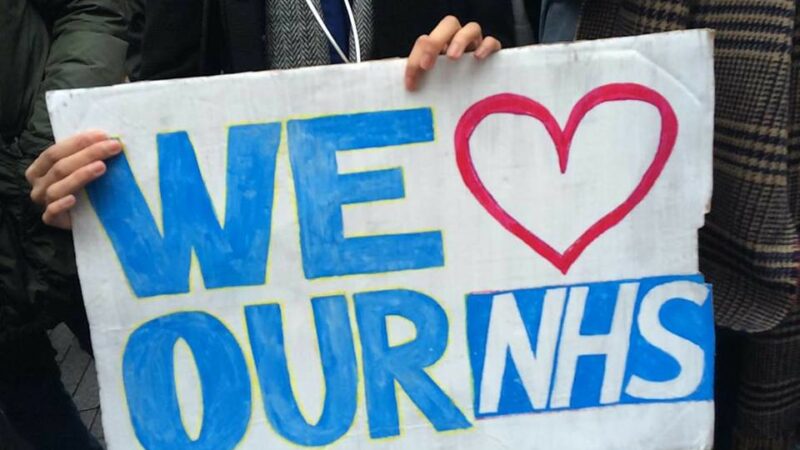'The NHS winter crisis has its roots in government policy.'

Diane Abbott is the Labour MP for Hackney North and Stoke Newington
The annual NHS winter crisis approaches. As the days grow shorter, the public will yet again expect an NHS in crisis mode. Ambulance logjams have soared. A report by the Association of Ambulance Chief Executives revealed that over 200,000 patients were stuck in the ambulance outside hospital for longer than the 15 minute national target in September alone. The number of patients stuck outside hospital for over an hour has also massively increased in the last two years.
Sadly, seasonal pressures that push the NHS to the limit have been normalised as an immovable fact of life. But these pressures should not be ascribed to forces beyond our control. The NHS winter crisis has its roots in government policy.
Instead of central government supporting the NHS directly, the last few decades have seen an intensification of private sector involvement. Neoliberal and right-wing politicians have consistently tried to shift the cost of the NHS away from government and back onto the patient, presumably because they would then be able to push through more tax cuts for the very wealthy.
This government has sought to further entrench and expand NHS privatisation, with the Health and Care Bill 2021. The proposed Integrated Care Boards would allow corporate private providers undue and unprecedented influence in how NHS services are run. This is on top of the quiet takeover of GP Surgeries by American healthcare giant Centene. Whilst the threat to the NHS is real, it is simply the latest example of a long running campaign to privatise the NHS.
Successive governments have sought to do this, from the 2014 Care Bill which fast tracked the ability to close hospitals to the Five Year Forward View report, which justified reducing healthcare coverage under the guise of integration and affordability. Even Tony Blair sought to use Private Finance Initiative’s (PFI’s) to fund hospitals that the public would pay for but never own. These PFI’s were described in 2018 by the former chairman of RBS Bank as “A fraud on the people”
The combination of underfunding and privatisation has eroded our NHS’s long-term capacity to care for patients. Waiting times have gone up over the last decade, as funding has been cut. On top of cuts to funding, the decline in living standards, increased rates of poverty and a crisis in social care demands more and more from NHS staff with less and less money.
This funding crisis left our NHS totally unprepared to deal with the Covid pandemic. How can ministers expect the NHS to deal with the Covid crisis when they are already battling a crisis of underfunding and privatisation?
The UK’s initial response to covid was marked with chronic PPE shortages and a government making it up as they go along. The Nightingale Hospitals were a prime example of such bungling. Huge hospitals were created seemingly overnight in sport stadiums, conference centres and other large venues. But with barely any staff (and subsequently no patients) they were an expensive failure.
The farce of these Nightingale hospitals shows us that government ministers don’t understand the problems in the NHS. They couldn’t see that underfunding had driven away staff with unimaginable pressure and low pay. These staff are the backbone of the NHS, and the service doesn’t exist without them. NHS staff, especially lower paid workers like nurses need a pay-rise and funding for their departments rather than ill-equipped, repurposed buildings with no patients.
The NHS is threatened by more than just incompetence. Corruption undermines the day-to-day operations of the NHS, with inferior or unusable equipment (such as PPE) being paid for by the taxpayer at astonishing prices. Deals with private companies are often made without public tender or scrutiny and some are probably tied to the personal financial interests of Conservative MP’s. Test and Trace alone has a budget of £37 billion over 2 years, despite it being essentially ineffective and run in an appalling fashion. As my colleague and constituency neighbour Meg Hillier MP, chair of the public accounts committee has said, Test and Trace has failed to achieve what it set out to despite the eye-watering sums of taxpayer’s money spent. And let us not forget, the NHS branding is purely an exercise in laundering the reputation of the private company that really runs Test and Trace, Serco.
The government’s legislative agenda will further open our NHS up to privatisation and especially pharmaceutical companies. These (often American) companies are not satisfied with impoverishing US patients with exorbitant drug prices. Now they are circling the rest of the NHS, like sharks that smell blood. If we want to halt and reverse the damage being done to our National Health Service, we must organise and fight back. As the saying goes, The NHS will last as long as there are folk left to fight for it.
Left Foot Forward doesn't have the backing of big business or billionaires. We rely on the kind and generous support of ordinary people like you.
You can support hard-hitting journalism that holds the right to account, provides a forum for debate among progressives, and covers the stories the rest of the media ignore. Donate today.



